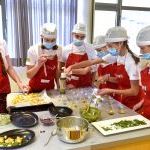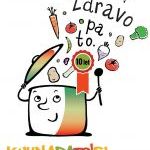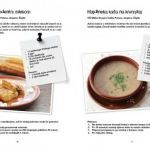Cooking Kids
About ten years ago, many Slovenian children were eating fast-food, pizzas and processed foods rather than healthier seasonal and traditionally prepared food. The Cooking Kids project wanted to revive those Slovenian traditional cuisine recipes and to motivate children to eat healthily with enticing activities. In this project, kids cook for kids with traditional recipes, whilst also focusing on ways to reduce food waste. The project was granted an award from the European Commission - DG SANTE as one of the10 best practice projects in Europe.
Website
Useful links
Food for Life has lots of information to support cooking in schools
Country
Media
* TOP TIP *
'Research food in your local area. Visit farmers or speak to food producers and design a menu for school lunch that reflects local food traditions'
How is the project linked to climate change & sustainability?
The project is encouraging children to eat fresh, local, seasonal food , whilst also minimising food waste. These measures are good for health and also for the planet. Local food has minimal transportation distances and a low carbon footprint. Children are encouraged to reduce and reuse food waste whenever possible. Teaching children new ways of approaching food is the best way to implement these habits into their families. By doing this, the project is creating future consumers who will hopefully start purchasing more locally produced healthy foods, who will enjoy producing more food at home, while also minimising food waste.
Who is involved?
Children between the ages of eight and fourteen, teachers of home economics, school nutrition advisors and school chefs are all involved in the project. In addition, some most important people in the field of gastronomy in Slovenija are taking part, as well as the best local producers and restaurants and some of the biggest chain stores. The project is supported by the Ministry of Health in Slovenija and Spar Slovenija.
How are the participants involved?
At the beginning of school year there is training for all project participants. The children explore their local culinary heritage with the project mentors, test the recipes present the dishes to their peers. Once a month they they buy produce from small local producers and then prepare one of the traditional Slovenian meals for whole school, with a help of school chef. The children will sometimes present their masterpieces in public events. This may be as guests during a gala dinner in a hotel, or as street food during a local festival. At the end of the year, a winner is selected by public and gastronomic experts.
Participants of the project cooperate with Slovenian embassies all over the world and have travelled to Paris at the Planète du gout, where they cooked with Slovenian chef Ana Roš, who owns two Michelin stars. At embassies the project was presented as the most innovative culinary product from Slovenija. Participants also visited the Slovenian embassies in Brussels and London and prepared gala dinners with Slovenian dishes for the embassy staff. With the Slovenian Embassy they organized Slovenian Food Day, where 113 schools enjoyed Slovenian dishes.
Children have visited the best Slovenian food producers, food factories, restaurants, mediterranian garden and saw innovative use of herbs and edible flowers, production of yogurt, chocolate, meat products. On workshops children learn from most renowned Slovenian chefs. They cooperate in charity events such as cooking in a restaurant with chefs, where all earning was donated for culinary education of children from socially weak families.
Key steps
- Research to see if there are similar projects in your country
- Link to local food specialists like farmers, chefs, markets and independent food shops
- Plan a menu that represents your local area
- Arrange to take some children to a local food store to buy produce for a recipe
- Using the ingredients, cook your dishes for other children to sample
- Once you feel comfortable with the concept, consider scaling up to a larger local food themed event
- Work with the children to prepare supporting materials that demonstrate how local food is linked to sustainability
- Do you have a place for cooking with 4 - 10 children (not necessary a school)?
- Can you arrange different excursions: in food factories, to food producers, herbal gardens, workshops with chefs, picking up wild herbs, anything else?
- Think about who could be mentor in school – will they be pedagogues (not important what subject, they just have to be passionate about culinarics) or also nutritionists?
- Can you ask local cook or chef or some of the parents to help you prepare your dish in a really perfect manner?
- Which are the forgotten local dishes in your region? Who can you ask? How will you explore the culinary heritage of your region? Do you know the story behind the dish, the history?
- Think about which children will you invite – younger, older, mixed group?
- How will you present your innovative dishes o the public? Think about the place of presentation, about informing people and about the expenses of food – maybe you can get sponsorship.
- Don´t forget to invite journalists.
Quote: 'This programme is specially developed for kids of the world so that they could educate their parents. Kids do care. We should respect that!'



